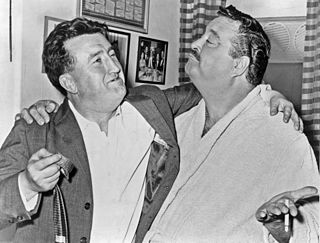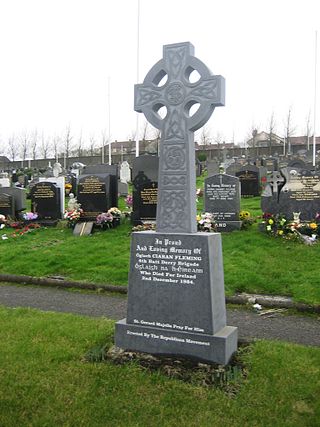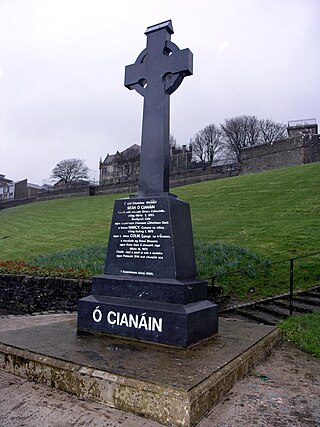Related Research Articles

Bloody Friday is the name given to the bombings by the Provisional Irish Republican Army (IRA) in Belfast, Northern Ireland on 21 July 1972, during the Troubles. At least twenty bombs exploded in the space of eighty minutes, most within a half-hour period. Most of them were car bombs and most targeted infrastructure, especially the transport network. Nine people were killed: five civilians, two British soldiers, a Royal Ulster Constabulary (RUC) reservist, and an Ulster Defence Association (UDA) member, while 130 were injured. The IRA said it sent telephoned warnings at least thirty minutes before each explosion and said that the security forces wilfully ignored some of the warnings for their own ends. The security forces said that was not the case and said they were overstretched by the sheer number of bombs and bomb warnings, some of which were hoaxes.

Brendan Francis Aidan Behan was an Irish poet, short story writer, novelist, playwright, and Irish Republican, an activist who wrote in both English and Irish. His widely acknowledged alcohol dependence, despite attempts to treat it, impacted his creative capacities and contributed to health and social problems which curtailed his artistic output and finally his life.
Events in the year 1972 in Ireland.
Anthony Magan was an Irish republican and chief of staff of the Irish Republican Army (IRA).
The Border campaign was a guerrilla warfare campaign carried out by the Irish Republican Army (IRA) against targets in Northern Ireland, with the aim of overthrowing British rule there and creating a united Ireland. It was also referred to as the "resistance campaign" by some Irish republican activists. The campaign was a military failure, but for some of its members was justified as it kept the IRA engaged for another generation.

Dáithí Ó Conaill was an Irish republican, a member of the IRA Army Council of the Provisional IRA, and vice-president of Sinn Féin and Republican Sinn Féin. He was also the first chief of staff of the Continuity IRA, from its founding in 1986 until his death in 1991. He is credited with introducing the car bomb to Northern Ireland.

Cathal Goulding was Chief of Staff of the Irish Republican Army (IRA) and the Official IRA.
Sinn Féin is the name of an Irish political party founded in 1905 by Arthur Griffith. It became a focus for various forms of Irish nationalism, especially Irish republicanism. After the Easter Rising in 1916, it grew in membership, with a reorganisation at its Ard Fheis in 1917. It split in 1922 in response to the Anglo-Irish Treaty which led to the Irish Civil War and saw the origins of Fianna Fáil and Fine Gael, the two parties which have since dominated Irish politics. Another split in the remaining Sinn Féin organisation in the early years of the Troubles in 1970 led to the Sinn Féin of today, which is a republican, left-wing nationalist and secular party.
The Northern campaign was a series of attacks by the Irish Republican Army (IRA) Northern Command between September 1942 and December 1944 against the security forces in Northern Ireland. The action taken by the Northern Irish and the Irish governments as a result of these attacks shattered the IRA and resulted in the former being free from IRA activity by the end of World War II. In December 1956 the IRA began its Border Campaign which lasted until February 1962.
Antoine Mac Giolla Bhrighde, English Tony or Anthony MacBride, was a Provisional Irish Republican Army (IRA) volunteer from Desertmartin, County Londonderry, Northern Ireland. He was shot dead by the British Army in 1984 whilst engaged in an attack on the Royal Ulster Constabulary.
Jimmy Steele was an Irish republican militant. He was one of the most prominent Irish Republican Army (IRA) men in Belfast after the Irish Civil War who held practically every senior position in the Northern Command of the IRA. Later in life Steele publicly denounced the leadership of the IRA which was a prelude to the split in the IRA. Steele founded and edited several Irish Republican publications. Steele spent a large portion of his life in jails as a result of his actions against British security forces.

Kieran or Ciarán Fleming, was a volunteer in the 4th Battalion, Derry Brigade of the Provisional Irish Republican Army (IRA) from the Waterside area of Derry, Northern Ireland. He died while attempting to escape after a confrontation with British troops in 1984.

Seán Keenan was an Irish republican from Derry, Northern Ireland. His father Seamus Keenan was a Quartermaster in the Irish Republican Army (IRA).

Seán McCool was a prominent Irish Republican and a former chief of staff of the Irish Republican Army. Imprisoned on numerous occasions, both North and South of the border, he embarked on a number of hunger strikes in order to secure his release. During the 1930s, McCool was one of the few socialists to remain in the IRA after the Republican Congress's decision to split. He stood as a candidate for the Irish Republican party Clann na Poblachta before leaving them as a result of their decision to go into government with Fine Gael.

Seán Mac Stíofáin was an English-born chief of staff of the Provisional IRA, a position he held between 1969 and 1972.
Larry Grogan was an Irish republican activist.

The King's Cross station and Euston station bombings were two bombing attacks on 10 September 1973 by the Provisional Irish Republican Army (IRA) that targeted two mainline railway stations in central London. The blasts wounded 13 civilians, some of whom were seriously injured, and also caused large-scale but superficial damage. This was a second wave of bombing attacks launched by the IRA in England in 1973 after the Old Bailey car bombing earlier in the year which had killed one and injured around 200 civilians.
Patrick MacGrath was born into an old Dublin republican family and took part in the 1916 Rising, as did two of his brothers. He was sent to Frongoch Internment Camp after the 1916 Rising and served his time there. He was a senior member of the Irish Republican Army (IRA), hunger striker, IRA Director of Operations and Training during its major bombing/sabotage in England and was the first of six IRA men executed by the Irish Government between 1940–1944. After participating in the Easter Rebellion, MacGrath remained in the IRA, rising in rank and becoming a major leader within the organisation.
Irish Revolutionary Forces (IRF) was a short-lived Irish republican paramilitary organisation in Cork in the 1960s.
References
- ↑ Cal McCrystal, "Divided together. Always", The Observer , 24 May 1998
- ↑ Seán Mac Stíofáin, Revolutionary in Ireland, p. 3
- ↑ Brian Lacy, Siege city: the story of Derry and Londonderry, p. 243
- ↑ Martin Dillon, The Enemy Within, p. 58
- ↑ Ed Moloney, A Secret History of the IRA
- 1 2 3 E. H. Mikhail, Brendan Behan: Interviews and Recollections, pp. 167-168
- 1 2 F. W. S. Craig, British Parliamentary Election Results 1950-1970, p. 685
- ↑ "S.F. launches campaign in Derry", Irish Times , 7 October 1959
- ↑ "Protests follow arrest of Mac Stiofain", Irish Times , 20 November 1972
- ↑ "IRA leaders' release alarmed Macmillan", Irish Independent , 28 April 2000
- ↑ Matt Treacy, The IRA 1956–69: Rethinking the Republic, p. 113
- ↑ "A day with Daisy", Larchwood Care, 22 July 2015
- ↑ "Sad passing of Derry republican Manus Canning". Derry Journal. 16 March 2018. Retrieved 5 February 2019.